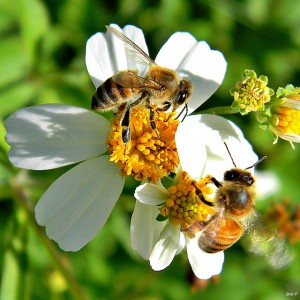Neonicotinoid-coated seeds are bad for wild bees
While a large number of studies have documented the detrimental effects that neonicotinoid pesticides have on honey bees, relatively few studies have focused on how they may affect wild bees. Now, a new study published in the journal Nature has shown that the use of neonicotinoid-coated seeds is detrimental to wild bee populations. Researchers used eight pairs of fields, one field in each pair was sown with neonicotinoid-coated oilseed rape seeds and the other pair was sown with seeds coated only with fungicide. They then compared the density of wild bees, the nesting activity of a native solitary bee, the colony development of the bumblebee and the strength of honey bee colonies between each paired field. The study yielded four primary results. (1) There was a decline in the density of bumblebees, and solitary bees in fields where neonicotinoid-coated seeds were planted. (2) Use of neonicotinoid-coated seeds was correlated with reduced nesting in solitary bees. (3) Bumblebee reproduction and colony growth declined in fields where neonicotinoid seeds were planted, and (4) The use of neonicotinoid- coated seeds did not significantly affect the strength of European honeybees. These results suggest that simply using honey bees in environmental risk assessments of neonicotinoids may not accurately reflect the risk to other bee species. The authors conclude that the use of insecticide-coated seeds “can pose a substantial risk to wild bees in agricultural landscapes, and the contribution of pesticides to the global decline of wild bees may have been underestimated.”



